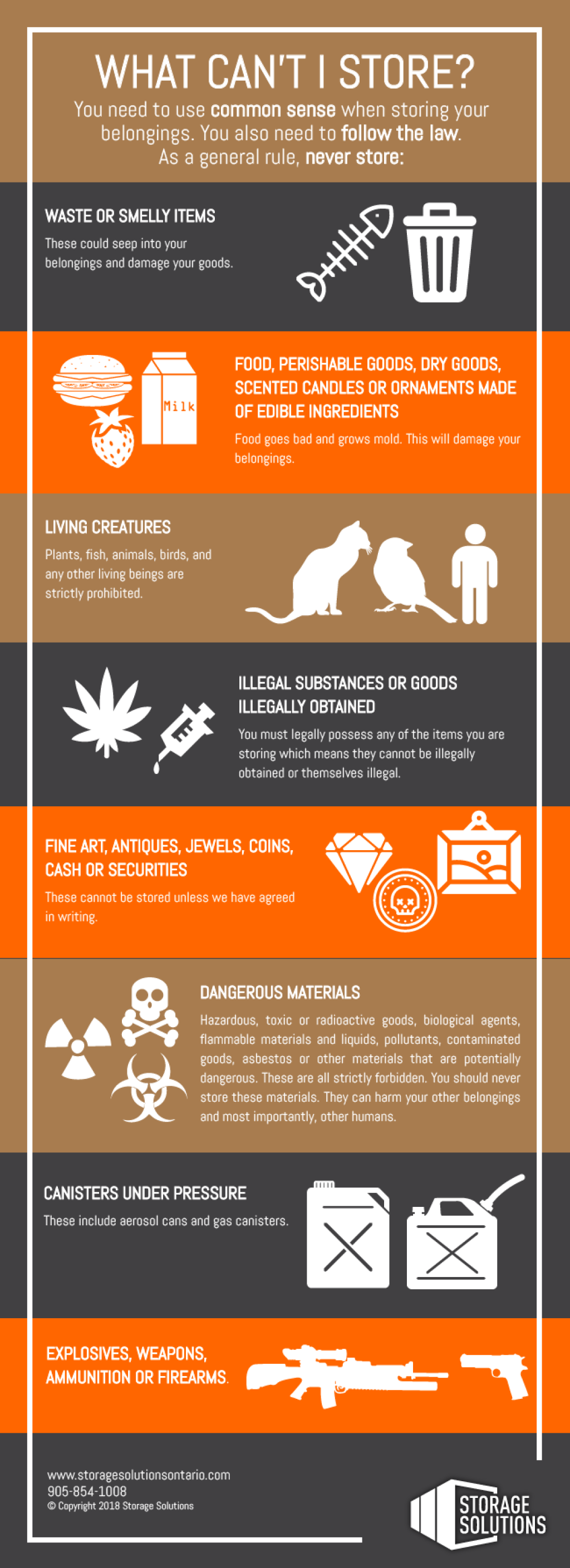Discover The Full List Of Self Storage Prohibited Items – Act Now!
Self Storage Prohibited Items: Ensuring Safety and Compliance
Greetings, dear storage enthusiasts! In the world of self storage, proper management of prohibited items is crucial to ensure safety, compliance, and peace of mind. Whether you’re a storage aficionado or a newcomer to the industry, understanding the ins and outs of prohibited items is essential. This article aims to provide you with comprehensive information on the subject, guiding you through the what, who, when, where, why, and how of self storage prohibited items, along with their advantages, disadvantages, frequently asked questions, and concluding remarks.
Table of Contents
What Are Prohibited Items in Self Storage?
Who Determines Prohibited Items?
When Should You Be Aware of Prohibited Items?
Where Can You Find Information About Prohibited Items?
Why Are Prohibited Items Important?
How to Handle Prohibited Items?
Advantages and Disadvantages of Prohibited Items Policies
Frequently Asked Questions
Conclusion
Final Remarks
2 Picture Gallery: Discover The Full List Of Self Storage Prohibited Items – Act Now!


What Are Prohibited Items in Self Storage? 🚫

Image Source: selfstoragecentre.co.uk
Prohibited items in self storage refer to the items that are not allowed to be stored within a storage facility. These items can vary depending on the facility’s policies, local regulations, and safety considerations. While the specific prohibited items may differ from one facility to another, some common examples include hazardous materials, flammable substances, perishable items, living organisms, firearms, illegal drugs, stolen goods, and items with sentimental or emotional value.
Understanding the Risks
Prohibited items are restricted for a reason. They pose potential risks to the property, other customers’ belongings, and the individuals involved in the storage facility, including staff and visitors. Knowing the risks associated with certain items helps maintain a secure storage environment.
Ensuring Safety and Compliance

Image Source: storagesolutionsontario.com
Storage facilities have a responsibility to ensure the safety and compliance of their premises. By implementing policies regarding prohibited items, they protect their customers, their property, and themselves from potential harm, legal issues, and violations of regulations.
Who Determines Prohibited Items? 📏
The determination of prohibited items is primarily made by the storage facility administrators, in compliance with local laws and regulations. The facility owners and managers assess potential risks, consult legal experts, and consider industry best practices to establish the list of items not allowed within their premises.
Legal Requirements
Facility administrators must be aware of and adhere to relevant local, state, and federal regulations that may dictate certain items as prohibited. These regulations often aim to protect public safety, prevent environmental hazards, and maintain overall order and security.
Custom Policies
In addition to legal requirements, storage facilities may establish their own policies regarding prohibited items based on their specific clientele, the nature of their business, and their risk management strategies. These policies help set the boundaries for what can be stored and ensure a consistent approach to safety and compliance.
When Should You Be Aware of Prohibited Items? ⚠️
Awareness of prohibited items is crucial at different stages of your self storage journey. Whether you are considering renting a storage unit, organizing your belongings, or accessing your stored items, understanding the restrictions can save you time, money, and potential legal troubles.
Prior to Renting a Storage Unit
Before renting a storage unit, it is essential to familiarize yourself with the facility’s policies on prohibited items. This knowledge allows you to make informed decisions regarding what can and cannot be stored, ensuring you choose a facility that aligns with your needs and complies with your storage requirements.
During the Organizing Phase
While organizing your belongings for storage, take the time to identify any prohibited items you may possess. This can prevent you from accidentally packing or storing items that could potentially violate the facility’s policies or pose risks to your stored belongings and those nearby.
When Accessing Stored Items
Even after storing your items, it is important to remain aware of the facility’s prohibited items policies. When accessing your stored belongings, adhere to the guidelines and restrictions to ensure the continued safety and compliance of the facility.
Where Can You Find Information About Prohibited Items? 📚
Information regarding prohibited items can be found from various sources, including:
Storage Facility Website and Documentation
The storage facility’s website often contains details about their policies, including prohibited items. Additionally, rental agreements, rules and regulations, and frequently asked questions documents provided by the facility may outline the prohibited items and their associated guidelines.
Direct Communication with Facility Administrators
If you have specific questions or concerns about prohibited items, reach out to the facility administrators directly. They can provide you with accurate and up-to-date information tailored to their facility’s policies and regulations.
Local Laws and Regulations
Consult local laws and regulations that may apply to self storage facilities in your area. These regulations may outline the prohibited items and the legal consequences of non-compliance.
Why Are Prohibited Items Important? ❓
Prohibited items are essential for maintaining safety, protecting property, and ensuring compliance within self storage facilities. Here are some key reasons why these restrictions matter:
Preventing Accidents and Hazards
Prohibited items often include hazardous materials, flammable substances, and potentially dangerous goods. By prohibiting their storage, facilities protect individuals, property, and the environment from accidents, fires, explosions, and other hazards.
Mitigating Risk of Damage
Some items, such as perishable goods or living organisms, can deteriorate over time and cause damage to the stored items, neighboring units, and the storage facility as a whole. Prohibited items policies help prevent such damage and maintain the overall integrity of the facility.
Complying with Legal and Insurance Requirements
Facilities that allow prohibited items can face significant legal and insurance challenges. By strictly enforcing prohibited items policies, storage facilities ensure compliance with applicable laws and maintain insurance coverage, protecting all parties involved.
How to Handle Prohibited Items? 📦
If you discover that you possess prohibited items while organizing your belongings or accessing your storage unit, it is important to handle them properly. Here are some steps to take:
Identify the Prohibited Items
Thoroughly review the facility’s policies and guidelines to identify the prohibited items in your possession.
Remove the Prohibited Items
Remove any prohibited items from your storage unit promptly. This ensures compliance with the facility’s policies and avoids potential risks to your belongings and the facility.
Dispose or Relocate the Items
Dispose of the prohibited items responsibly, following the appropriate guidelines for their disposal. If applicable, consider relocating the items to an alternative storage solution that allows them.
Seek Assistance from Facility Administrators
If you are unsure about how to handle specific prohibited items, reach out to the facility administrators for guidance. They can provide you with the necessary information and support to ensure compliance.
Advantages and Disadvantages of Prohibited Items Policies ✅❌
Prohibited items policies come with their own set of advantages and disadvantages. Let’s explore both sides:
Advantages
Enhanced safety for individuals, property, and the environment.
Protection against potential legal issues and insurance challenges.
Prevention of damage caused by prohibited or hazardous items.
Creation of a consistent and secure storage environment.
Compliance with local laws and regulations.
Disadvantages
Potential limitations on storing certain items with sentimental or emotional value.
Restrictions on the storage of certain legal items that may be perceived as risky.
Frequently Asked Questions ❓
Let’s address some common questions regarding self storage prohibited items:
1. Can I store my firearms in a self storage unit?
No, storage facilities generally prohibit the storage of firearms due to safety concerns. It is important to check with the facility administrators for any specific guidelines regarding firearms in your area.
2. Are flammable substances always prohibited in self storage?
Yes, most storage facilities have strict prohibitions on storing flammable substances such as gasoline, propane tanks, and fireworks. These items pose significant risks and are typically not allowed within storage units.
3. What should I do if I accidentally stored a prohibited item?
If you discover that you have mistakenly stored a prohibited item, promptly notify the facility administrators. They will provide guidance on how to handle the situation and support you in ensuring compliance.
4. Can I store perishable food items in a self storage unit?
No, perishable food items are generally prohibited due to the potential for spoilage, mold growth, and attracting pests. Storing such items can result in damage to your belongings and neighboring units.
5. Are there any insurance implications for storing prohibited items?
Yes, insurance coverage may be affected if prohibited items are stored. It is crucial to review your insurance policy and consult with the facility administrators to understand the implications and ensure compliance.
Conclusion
By now, you should have a comprehensive understanding of self storage prohibited items and their importance. Remember to always consult the storage facility’s policies, adhere to local regulations, and prioritize safety when organizing your belongings. By following the guidelines and being mindful of restricted items, you can ensure a secure storage experience for yourself and others.
Final Remarks
Choosing a self storage facility that prioritizes safety and compliance is vital. Always verify the storage facility’s policies and familiarize yourself with the prohibited items list. This article serves as a general guide, and it is essential to consult with the storage facility administrators or legal professionals for specific advice related to your circumstances. Stay informed, organize responsibly, and enjoy the benefits of self storage while keeping your belongings and the environment safe.
This post topic: Self Storage

